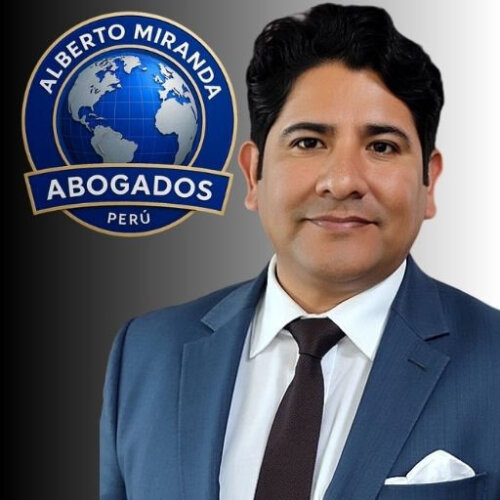Best Family Lawyers in Peru
Share your needs with us, get contacted by law firms.
Free. Takes 2 min.
Free Guide to Hiring a Family Lawyer
Or refine your search by selecting a city:
List of the best lawyers in Peru
About Family Law in Peru
Family law in Peru is designed to address and resolve various legal matters within family relationships. It encompasses a wide range of issues such as marriage, divorce, child custody, adoption, spousal support, and domestic violence. The Peruvian civil code is largely influenced by Spanish law and reflects the nation's commitment to ensuring the rights and duties of family members are respected and protected. The primary objective is to promote familial harmony while safeguarding individual rights and well-being.
Why You May Need a Lawyer
There are several situations where you might need the assistance of a family lawyer in Peru:
- Divorce and Separation: Legal guidance is crucial to navigate the complexities of property division, alimony, and custody arrangements.
- Custody and Child Support: Ensuring children's best interests are prioritized often requires legal intervention, especially in contentious situations.
- Domestic Violence: Victims of domestic abuse need legal protection and advocacy to secure restraining orders and safety measures.
- Adoption: During adoption, legal advice is essential to comply with regulations and ensure a smooth process.
- Marital Agreements: Drafting prenuptial or postnuptial agreements can prevent future conflicts and ensure fairness.
Local Laws Overview
The family law framework in Peru is governed by the Civil Code and various specialized statutes. Key aspects of local laws include:
- Cohabitation Laws: Peru recognizes the rights of cohabiting partners similar to those of married couples under certain conditions.
- Marriage: Both civil and religious marriages are recognized, but the legal effects stem from civil registration.
- Divorce: Divorce can be mutual, unilateral, or fault-based, each with different legal requirements and processes.
- Child Custody: Courts prioritize the child's best interests when determining custody and visitation rights.
- Adoption: The process involves court intervention and adherence to strict protocols to protect children’s welfare.
Frequently Asked Questions
What is the legal age for marriage in Peru?
The legal age for marriage is 18 years. However, individuals aged 16 and 17 may marry with parental consent or court authorization.
How can I obtain a divorce in Peru?
Divorce can be obtained through mutual consent, unilateral petition, or due to specific reasons such as adultery, abuse, or criminal conviction. Legal representation is recommended.
What are the grounds for child custody decisions in Peru?
Child custody is determined based on the child's best interests, considering factors like emotional bonds, siblings, and the ability of each parent to provide care and support.
Is common-law marriage recognized in Peru?
Yes, stable unions analogous to marriage are recognized if they meet certain legal criteria, granting similar rights as those of civil marriages.
How can I protect myself legally from domestic violence?
Victims can seek court-issued protective measures and support from social services and law enforcement to ensure their safety and well-being.
What is the process for adopting a child in Peru?
The adoption process involves rigorous evaluations by child welfare services and judicial approval to ensure the child’s best interests are met.
Can I modify a child support agreement?
Yes, child support agreements can be modified if there are significant changes in circumstances affecting the welfare of the child or the financial status of the parents.
Are prenuptial agreements legal in Peru?
Yes, prenuptial agreements are legally recognized and can define property and financial arrangements in the event of divorce.
What is the concept of parental authority in Peru?
Parental authority encompasses the rights and responsibilities parents have over their minor children, including care, education, and positive upbringing.
How is property divided in a divorce?
Property acquired during the marriage is subject to equitable distribution, while personal assets are typically exempt. Legal guidance is crucial to ensure fair division.
Additional Resources
For further assistance, consider reaching out to the following resources:
- Defensoría del Pueblo: Offers guidance and support on human rights and legal matters.
- Ministerio de la Mujer y Poblaciones Vulnerables: Provides assistance and resources for issues such as domestic violence and child welfare.
- Public ministry: Engage with the public ministry for legal aid and advice in family law matters.
Next Steps
If you require legal assistance in family law, consider the following steps:
- Consult a Lawyer: Seek advice from a qualified family lawyer specializing in Peruvian law.
- Gather Documentation: Collect relevant documents such as marriage certificates, childbirth records, or financial statements.
- Research: Familiarize yourself with basic family law principles applicable to your situation.
- Explore Mediation: Attempt mediation or alternative dispute resolution if relevant to avoid lengthy court battles.
- Contact Local Agencies: Reach out to governmental bodies or NGOs for additional support and resources.
Lawzana helps you find the best lawyers and law firms in Peru through a curated and pre-screened list of qualified legal professionals. Our platform offers rankings and detailed profiles of attorneys and law firms, allowing you to compare based on practice areas, including Family, experience, and client feedback.
Each profile includes a description of the firm's areas of practice, client reviews, team members and partners, year of establishment, spoken languages, office locations, contact information, social media presence, and any published articles or resources. Most firms on our platform speak English and are experienced in both local and international legal matters.
Get a quote from top-rated law firms in Peru — quickly, securely, and without unnecessary hassle.
Disclaimer:
The information provided on this page is for general informational purposes only and does not constitute legal advice. While we strive to ensure the accuracy and relevance of the content, legal information may change over time, and interpretations of the law can vary. You should always consult with a qualified legal professional for advice specific to your situation.
We disclaim all liability for actions taken or not taken based on the content of this page. If you believe any information is incorrect or outdated, please contact us, and we will review and update it where appropriate.
Browse family law firms by service in Peru
Peru Attorneys in related practice areas.
Browse family law firms by city in Peru
Refine your search by selecting a city.











